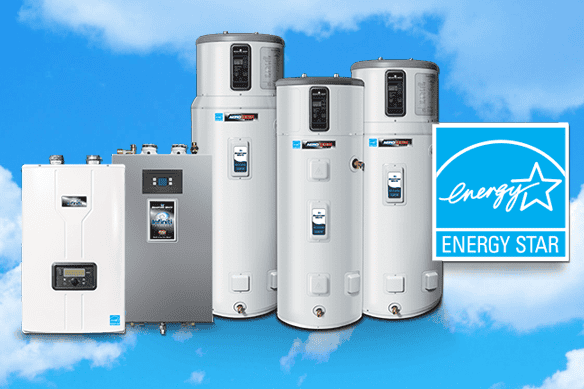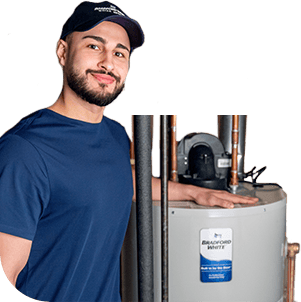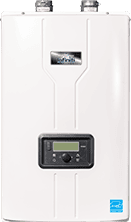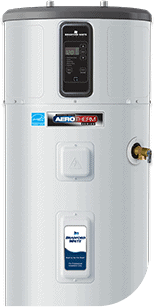Understanding Water Heater Efficiency

A Guide for Homeowners
In today’s energy-conscious world, homeowners are increasingly looking for ways to make their homes more efficient and lower their energy costs. Your water heater is the second largest user of energy in your home, so it can greatly impact your energy consumption and utility costs. This guide will provide a comprehensive understanding of water heater efficiency, the importance of the UEF (Uniform Energy Factor), and what it means to have an ENERGY STAR® certified water heater.
What is Water Heater Efficiency?
Water heater efficiency refers to how effectively a water heater converts energy into hot water. The more efficient your water heater, the less energy it uses to produce hot water, which leads to lower utility bills and a reduced environmental footprint. Efficiency can vary depending on the type, age, and model of the water heater.
Understanding UEF (Uniform Energy Factor)
The Uniform Energy Factor (UEF) is a standardized metric used to measure the energy efficiency of water heaters. It was developed to replace the older Energy Factor (EF) rating, providing a more accurate assessment of a water heater’s performance. Here’s what you need to know about UEF:
How UEF is Calculated
UEF is calculated based on the amount of hot water produced per unit of fuel consumed over a typical day. The calculation takes into account various factors, including:
- Recovery efficiency: How effectively the heat is transferred to the water.
- Standby losses: The amount of heat lost per hour from the stored water compared to the heat content of the water.
- Cycling losses: The loss of heat as the water circulates through the water heater.
UEF Categories
UEF ratings are categorized into four groups based on the water heater’s size and type of usage:
- High: Suitable for households with high hot water demand.
- Standard: Fits average household needs.
- Medium: Optimized for smaller homes or lower hot water demand.
- Low: Ideal for compact spaces or minimal hot water use.
A higher UEF rating indicates a more efficient water heater. When comparing models, use the UEF rating to assess which unit will provide better energy savings over time. Learn more about your water heater’s UEF rating here.
What is ENERGY STAR® Certification?
ENERGY STAR® is a government-backed program that certifies energy-efficient appliances, including water heaters. Products with the ENERGY STAR® label meet strict efficiency criteria established by the U.S. Environmental Protection Agency (EPA). Here’s why ENERGY STAR® Certification matters:
Benefits of ENERGY STAR® Certified Water Heaters
- Energy Savings: ENERGY STAR® certified water heaters typically use 10-50% less energy than standard models. This translates to significant savings on your energy bills.
- Environmental Impact: By using less energy, these water heaters reduce greenhouse gas emissions, contributing to a lower carbon footprint.
- Performance: ENERGY STAR® certified models are tested for performance, ensuring they deliver hot water consistently and reliably.
- Rebates and Incentives: Many utility companies offer rebates and incentives for purchasing ENERGY STAR® certified appliances, making them more cost-effective. You can search here for available rebates and tax credits in your area.
New Technology in ENERGY STAR® Certified Water Heaters
In order to deliver greater efficiency, water heater manufacturers are embracing new technologies in their ENERGY STAR® certified water heaters. These water heaters include:
- Heat Pump Water Heaters (Hybrid): These use advanced heat pump technology to transfer existing heat from the air to help heat water. That makes them two to three times more energy-efficient than conventional electric water heaters. Check out the advanced AeroTherm® Series Heat Pump Water Heater from Bradford White.
- Tankless Water Heaters: Because tankless water heaters only run when hot water is needed, they can be exceptionally efficient. Learn more about tankless water heaters here.
Did you know? Bradford White’s dedication to energy efficiency innovation and promotion has made them a five-time ENERGY STAR® Partner of the Year (2020, 2021, 2022, 2023 & 2024). Learn more about Bradford White’s ENERGY STAR® certified water heaters here.
How to Choose an Efficient Water Heater
When selecting a water heater, consider the following factors to ensure you choose the most efficient model for your home:
- Determine Your Hot Water Needs: Assess your household’s daily hot water usage to select a water heater with the appropriate capacity and UEF rating.
- Consider Fuel Type: Choose between electric, gas, or hybrid/heat pump/electric options based on availability, cost, and sustainability goals.
- Evaluate Initial Cost vs. Long-Term Savings: While high-efficiency models may have a higher upfront cost, they often result in greater long-term savings on energy bills.
- Check for Rebates and Incentives: Look for local utility rebates or federal tax credits that can offset the initial purchase price of an ENERGY STAR® certified water heater.
- Consult with a Professional: Work with a licensed plumber or HVAC professional to understand the best options for your home and ensure proper installation. Need to find a plumber near you? Search here to find a Bradford White professional in your area.
Conclusion
Understanding water heater efficiency is crucial for homeowners looking to reduce energy consumption and save on utility bills. By familiarizing yourself with UEF ratings and the benefits of ENERGY STAR® certified models, you can make an informed decision when it’s time to replace or upgrade your water heater. Investing in an efficient water heater not only provides immediate cost savings but also contributes to a more sustainable future.
For more expert advice on home energy efficiency, stay tuned in to our blog page.



